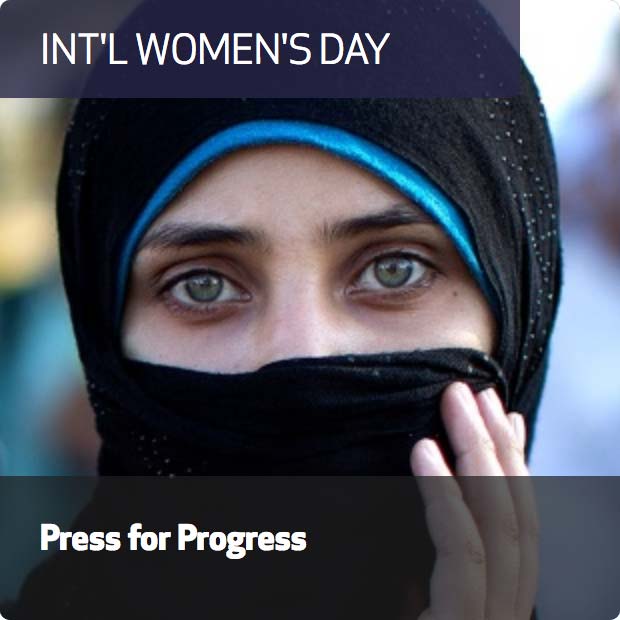Standing Up for Change
Women’s rights are a pathway to addressing social and political challenges around the world.
Women are pressing publicly as never before for a realignment of relations between the genders and showing courage to stand up with fresh boldness – in offices and on the streets, in the press and social media, even before global audiences at the Academy Awards.
All these women take risks and deserve congratulations – and the men who stand with them.
Yet on International Women’s Day, IWPR celebrates those women who are standing up in even more challenging circumstances, and indeed those women who always have.
In some of the most dangerous environments anywhere around the world, these women provide inspiration and hope. In areas of conflict, it is so often women who protect the family, sustain a semblance of normal life, drive humanitarian services – and take a stand against war itself.
In areas of dictatorship, it is so often women who lead human rights groups, build coalitions of support for democratic values, and nurture a plural and civic vision against corrupt cartels and “business as usual”.
And in areas of extreme religious influence, it is women who must find ways to take on a whole system and tradition of control – from access to education and work to health care and sexual choice. The ultimate challenge is to shift an entire mind set of human relations and the goal is in fact the liberation of both genders.
Over a quarter of a century, IWPR has been honoured to work with and to support an extraordinary line up of courageous women: from leading human rights defenders Natasha Kandic and Sonja Biserko in Belgrade to Gordana Igric and the entire women-led team of our former colleagues at the Balkan Investigative Reporting Network, from top frontline war reporters Gjeraqina Tuhina (Kosovo), Galima Bukharbaeva (Uzbekistan) and the late Sahar al-Haidari (Iraq) and Anna Politskaya (Russia) to the remarkable Nobel Laureate and former IWPR trainee Malala Yousafzai, and continuing now to award-winning Syrian documentary filmmaker Zaina Erhaim, among many others.
It is a long and storied roll call, and well beyond coincidence. Perhaps from their exclusion from male-dominated structures, women are sometimes able to see the problems more clearly: war makers cannot be peace builders. Perhaps, with less of a stake, they have less to lose and more of a motivation for change. Perhaps, suffering so sharply, they have no other choice but to fight – peacefully – for change, whether through the media, through activism or via the ballot box.
Just last week I was incredibly moved to meet a pair of local women activists who, unable to travel any other way, drove 24 hours across the highly insecure badlands of Libya to attend an IWPR training conference in Tunis – amazing tenacity and bravery. Special mention too to our proud partnership with the Marie Colvin Journalists’ Network, commemorating the loss of a dear friend and one of the best war correspondents of a generation, and supporting continuing training and mentoring for female reporters across the Middle East.
The fact is that time has been up for a very, very long time, but a hashtag, however powerful, is not enough. For our part, IWPR is committed to continuing and expanding women’s programming, as well as “mainstreaming” its focus on gender equality within all activities. That will take work, and we pledge to keep at it. Women’s rights are absolutely human rights, and a pathway to addressing so many of the social and political challenges in difficult environments around the world.
Meantime, whether in the board room or the frontlines, we salute the women – and the men – of courage working at such risk to make change. Your courage and your efforts inspire us to recommit to our own.
Anthony Borden is the founder and Executive Director of the Institute for War & Peace Reporting (IWPR).

